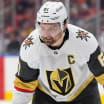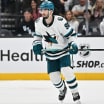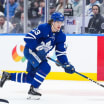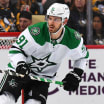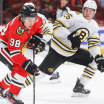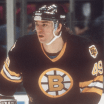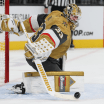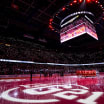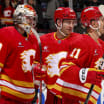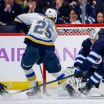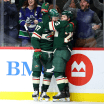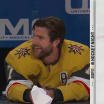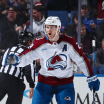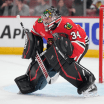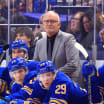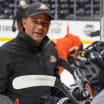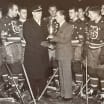Legendary hockey reporter and analyst Stan Fischler writes a weekly scrapbook for NHL.com. Fischler, known as "The Hockey Maven," will share his knowledge, humor and insight with readers each Wednesday.
This week's edition features a 1971 interview with Hall of Famer Maurice Richard, one of the greatest stars from the Original Six era. The 'Rocket," then 50 years old and living in Montreal, sat down with Stan, who eventually ghosted Richard's autobiography, "The Flying Frenchmen."
Here are some highlights of that conversation from almost a half-century ago.
Voices from the past: Maurice Richard
'Rocket' talks about how he got his nickname, 50-in-50 season in 1971 interview
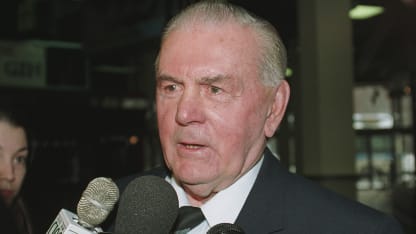
© Denis Brodeur/Getty Images
By
Stan Fischler
Special to NHL.com
What were your earliest hockey memories?
My father, who was a good semipro player, bought me my first pair of skates when I was 4 years old. I learned to skate on the frozen Back River near our house and also a makeshift backyard rink. By the time I graduated to Montreal Technical School I was playing hockey six days a week, and on the seventh I'd practice with my father. Then I was invited to play for a good junior team, the Verdun Maple Leafs. But I was only playing for fun and, frankly, I didn't think I was that good. I had no plans to become a pro hockey player until much later. In high school, I studied to be a machinist and during the summer I worked for a crane company; at the time, that was a pretty good job.
Who helped you most to push your hockey career toward the NHL?
A young player like me needed, beside my father, an older man around to give me direction. I was lucky that a fellow named Paul Stuart coached my team and took an interest in me. Pretty soon, I was making my way up the ladder; from Verdun to the Montreal] Canadiens junior team and eventually an invitation with the senior team in Montreal. But then the injury bug nearly killed my hockey career.
**How serious were the injuries?**
It started with a broken ankle with the senior team. After I came back, I broke my hand and I began to ask myself whether this was worth all the pain and frustration. By this time, my game was good enough for me to win an invitation to the NHL Canadiens training camp in the fall of 1942, and I wound up as the best of two prospects in camp. But in my 16th NHL game I broke my ankle again. Hockey writers were calling me "brittle." As I was carried off the ice, I said to myself, "Maurice, when will these injuries ever end?" But after I recovered, the injuries stopped and playing NHL hockey for me became a lot of fun.
**What were your biggest challenges at first in the NHL?**
My first Canadiens coach was Dick Irvin, and he was a very good leader. But when he criticized a player, he did it in front of the entire team. That was very embarrassing and frightening to a rookie like me. My other problem was that I couldn't speak English. In fact, at first the only English words I knew were "yes" and "no." I was deathly afraid to even try to say anything in English for fear of making a mistake and looking foolish. I'd just sit there silently. That's why in my early years I got a reputation for being silent and sullen. In time I gained confidence, and with the help of teammates I began to understand what Irvin was saying.
**You have one of the most famous nicknames in NHL history. How did you get tagged "Rocket?"**
We were having a practice and I was on a line with
[Elmer Lach
at center and
Toe Blake
on the left. Eventually our unit got the nickname "Punch Line." We were scrimmaging against a line of
Phil Watson
,
Murph Chamberlain
and
Ray Getliffe
. In this practice I was flying, and when I got up a full head of steam, one of them said, "Watch out, here comes the Rocket." The three of them on the other side picked up the expression, and whenever I got the puck, they'd yell, "Here comes the Rocket!" Some newspapermen were there hearing me called the "Rocket," and the next day it appeared in the papers. It has stuck with me ever since.
You once scored a goal with a player on your back. How did that happen?
Chicago had a big defenseman named
Earl Seibert
who was trying to stop me on a breakaway. When he realized that he couldn't get in front of me, he threw his arms right on top of my shoulders. As I kept skating, Seibert's skates lifted off the ice flying in the air and back down on the ice again. When I was 10 feet from the net he threw all his weight on me -- he weighed about 200 pounds -- and I felt as if I would cave right in on the ice. Suddenly their goalie moved out at me and, somehow, I managed to jab the puck between his legs, while Seibert kept riding on my back.
What was it like to score 50 goals in 50 games, as you did in 1944-45?
Remember, in that season we had one of the greatest teams of all-time, so that was a big help to me.
Bill Durnan
was the best goalie I ever played in front of, and our defense, led by
Butch Bouchard
, was solid. My linemates were both terrific. Elmer Lach at center was a very hard worker who would always go into the corners and get me the puck; a real good playmaker. He also talked a lot and regularly antagonized the opposition; which helped keep them away from me. Meanwhile, Toe Blake never stopped skating hard and was an inspiration to me. That season (1944-45) the goals came easy for me and my skating had never been better.
What was the secret to your scoring success?
There never such a thing as a secret. I never planned a play in advance. Whenever there was a break, a chance in front of the net, I'd try to pick a spot. Everything I did was spontaneous, and every play I made seemed to be different from the one before. The other thing was that I was a left-handed shot, yet I played on the right side and that meant I used my backhand shot more than most forwards. The backhand tended to fool most goalies more than the regular forehand wrist shot.
What was it like when your kid brother, Henri, showed up at camp in 1955?
Dick Irvin had moved from coaching us and onto Chicago to coach the Black Hawks. Toe Blake took over our team. Everyone figured that Toe would keep Henri around for a few days and then ship him down to the minors. You have to remember that my kid brother was 15 years younger than me and different in almost every respect. Every time you looked around, he had the puck and he stuck with the team through training camp. Granted, he was small but he was tough and had all the ability. I was very proud of the kid.
Did you try to protect Henri?
At first I wanted to take him in hand and give him a lesson in the facts of NHL life. Then I decided we'd both be better off if I just left him alone. As it turned out, Henri never came to me for advice. But what kind of advice could I give him? He was a better stickhandler than I was and a better skater. He was a better all-round hockey player than me. The only difference was that he couldn't score goals the way I could. But he made up for that by becoming a terrific playmaker, which was just as important. He eventually got the nickname "Pocket Rocket," which was fine. But the most important impact Henri had on me was that with him on my line, I began to mellow.
You played with a team sprinkled with Hall of Famers. Who were your favorites?
Dickie Moore
played left wing on a line with me and Henri. I considered him one of the most underrated of the Canadiens. He was a fighter, a real worker and even won a scoring title playing half a season with a broken hand. For scoring explosiveness, we had
"Boom Boom" Geoffrion
. Even when he just barely beat me out for the scoring championship in 1954-55, I always had a soft spot in my heart for him. Boomer was funny, always pulling off a joke in the dressing room. I felt a much closer kinship to Boomer than I did to
Jean Beliveau
because Geoffrion and I were more alike personality-wise. Boomer was explosive like me. Every so often he'd lose his temper on the ice. After I retired, Beliveau eventually became captain but if Boomer had gotten the "C," the team would have been just as good and the players would have had more fun.
Montreal won the Stanley Cup in each of your last five seasons. When did you think about retiring?
By the mid-1950s, I was in my thirties and had gotten heavier and slower. I was 160 pounds when I started in pro hockey and by then I weighed over 200 pounds. With my weight that high, I wasn't the same "Rocket." I tried dieting a couple of times and lost about 10 pounds each time, but it made me feel weak. Finally, at training camp in the fall of] 1960, I made up my mind that I'd had it. The dizziness, the pushing and the fact that It was so hard to lose weight convinced me that I should retire.
**Who was the best opponent you ever faced?**
[Gordie Howe
. He was the best all-around player I ever saw. Gordie and I had one thing in common; if you gave him a bad check, he'd get even with you -- but he wouldn't start it. In that sense Gordie and I were the same. I would never hit anybody first if he hadn't done anything to me beforehand.

